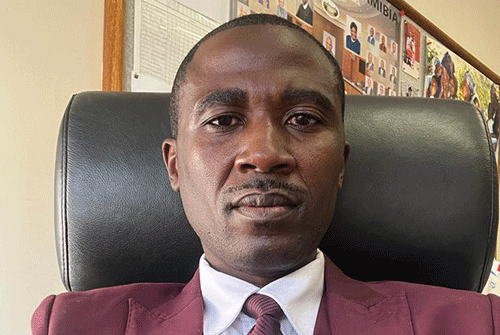Lahja Nashuuta
Effective communication is the lifeblood of any public service institution. It is the medium through which public institutions’ vision and goals are interpreted and understood by both its internal and external stakeholders.
Walters Kamaya is a Control Public Relations Officer at the Ministry of Health and Social Services and communicator of note with vast experience in strategic communications, brand management.
He specialised in public relations.
Kamaya holds a master’s degree in media studies from the University of Namibia and a bachelor’s degree in journalism and communication technology as well as an honours degree in journalism and communication technology from the Namibia University of Science and Technology.
Being at the helm of the Ministry of Health and Social Services’ public relations and communication division, Kamaya manages and coordinates the public relations activities that have to do with the ministry’s internal and external communication. He works with the media and engages stakeholders to ensure that the ministry’s projects and programmes are understood.
“Ministry of health positioned me to help people take charge of their own health through the help of the staff of the ministry. Educating people about the importance of taking food as their medicine instead of taking their medicines as their food,” Kamaya said.
Kamaya is also responsible for crisis management, campaigns and managing the ministry’s social media platforms.
“My expertise in public speaking is really helping to educate the public on all types of medicines administered as safe and effective. Persuasion skills are also one of the skills required to convince people. Interpersonal skills play a bigger role,” he maintained.
Joining the
public service
Kamaya who defines himself as self-driven, and a team player with a passion for helping people is not an infant to public service. He started working for the government in 2009 in the Ministry of Finance Directorate of Customs and Exercise at the Hosea Kutako International Airport. Before joining the public service, Kamaya worked for the Namibian Broadcasting Corporation TV as a bulletin producer, news translator and voice over as well as managing the Silozi indigenous language desk. He also worked for Lozi Radio station as a producer.
“It has been my dream to be a communicator or a journalist. During my time at school, I developed a strong interest in communication in which I specialised at the end of my four-year course,” he said.
In 2014, Kamaya joined the Ministry of Information and Communication Technology in the Directorate of Media Liaison as senior information officer, a position he held for almost two years. He then moved to the Ministry of Gender Equality and Child Welfare, where he served as a chief public relations officer.
Kamaya left the gender ministry in 2017 to work for the University of Namibia as a lecturer in the Faculty of Humanities and Social Sciences responsible for broadcasting and Unam radio station.
Highlighting some of his work-related accomplishments or memorable moments as a public servant at the MoHSS, Kamaya had this to say: “One of the accomplishments is on the campaigns of ‘Get vaccinated’ and ‘Kick Covid-19 out of Namibia’. After this campaign, many people changed their mindsets towards Covid-19 vaccines as it cleared all the myths they heard about it”.
Challenges
Every job comes with its fair share of challenges, and it is our ability to rise above them that defines our level of tenacity. For Kamaya,
what is challenging is to convince people to have health-seeking behaviour over their traditional practices and beliefs, for example, when it comes to vaccines and to make them believe it, is a challenging task. Some people opt to believe in lies and rumours circulating around. He, however, noted that the most satisfying is the level of engagement with the public on issues on which they need clarity.
Asked about his take on the effectiveness and efficiency of the public servants, and a public misconception that people working in public institutions are unproductive and inefficient, Kamaya said: “I don’t agree at all.
What happens is the government cannot operate like a private institution whereby things are done very quickly, especially approving of funds. In government, it is a process. Releasing information and getting information involves steps”.
On his bucket list for the years to come – both professionally and individually – Kamaya expressed his hope “to see people understanding health-seeking behaviour, whereby people regard their health as priority number one, unlike what people were doing during Covid-19 to consider steaming above the health facilities services”.


